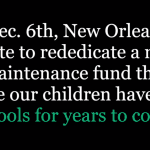Last week, Will Sentell at The Advocate reported that a panel appointed by the Legislature to review Louisiana’s teacher evaluation system is gearing up to recommend a series of changes that could seriously undermine efforts to ensure every child has an effective teacher. The 17-member School Accountability Commission began its review back in October and is expected to present its final proposed changes on February 2nd.
This week, our friends at the Louisiana Federation of Teachers (LFT) posted a survey asking educators to provide feedback on a series of proposed changes from the Louisiana Department of Education [see presentation below], as well as proposals from an coalition that includes LFT, the Louisiana Association of Educators (LAE), and the principals and school boards associations.
Even though I’m not an LFT member (not by any stretch of the imagination), I thought I’d give it a whirl and share my results. I’ve reproduced the survey below with my responses, although you can find the original here.
LFT Survey: Accountability Commission recommendations for evaluation
Teacher evaluation: You are making a difference!
Education leaders listened to your ideas and came back with some recommendations. Here’s your chance to respond to those suggestions.
Last fall, LFT asked teachers for their thoughts about the evaluation system known as Compass, and suggestions for its improvement.
More than 200 suggestions flooded the in-boxes of the State Accountability Commission. The Department of Education acknowledged your concerns in a report to the Accountability Commission.
At a January 5 meeting, the DOE gave preliminary recommendations for changes to the evaluation system to a subcommittee of the Accountability Commission.
The Accountability Commission will meet again in February to discuss these ideas. Please take a few minutes to look at these recommendations and let us know what you think about them.
Here are the DOE’s recommendations. What do you think of them?
1. Train school leaders on how to create and manage schools where teachers have daily conversations about student growth and personal skill development.
- Agree
- Disagree
- Need more information
Comment:
Not only is this critical to the success of Compass, it’s something that school leaders should be already be doing. Successful principals foster a culture of constant feedback, reflection, and improvement in their schools. They also focus on instructional leadership as their primary responsibility.
2. Expand the TAP Initiative.
- Agree
- Disagree
- Need more information
Comment:
In a previous role, I did extensive research on TAP:
The System for Teacher and Student Advancement – I’ve even attended the TAP Conference in D.C. – and, to be honest, I wasn’t all that impressed. The TAP rubric, while certainly better than many assessment tools, doesn’t set a very high bar in terms of instructional expectations. Moreover, cash-strapped districts and smaller schools may find it difficult to fully implement the TAP program with its Master/Mentor Teacher roles and performance bonuses. Finally, it just seems redundant to promote a program that otherwise incorporates many of the same key elements as Compass. Let’s just focus on Compass and get it right.
3. Develop a statewide principal mentorship program (to include the use of the Compass tool to support teacher improvement through collaboration, observation and feedback).
- Agree
- Disagree
- Need more information
Comment:
Mentorship programs always sound great in theory, but in practice, they often end up being lame and ineffective (the LATAAP mentorship program immediately comes to mind…). That being said, I would certainly be receptive to a mentorship program that provided structured, ongoing support and guidance to principals around Compass evaluations. Moreover, I think the program should specifically target the principals of those schools whose Compass results in no way reflect reality (I previously offered
a few obvious New Orleans examples here).
4. Goal setting for school leaders with the principals setting goals based on SPS improvements and DOE setting example targets to support principal and superintendent goal setting.
- Agree
- Disagree
- Need more information
Comment:
This is obvious – in fact, it should already be happening. Teacher/classroom goals should align and support school-wide goals, which in turn, should reflect the district’s overall academic goals.
5. Empower school leaders to provide feedback, final ratings, and contemplate multiple sources of information.
- Agree
- Disagree
- Need more information
Comment:
A bit confused – shouldn’t this already be happening, too?
6. Final ratings should be informed by multiple sources of information, not a single data point (VAM).
- Agree
- Disagree
- Need more information
Comment:
Final ratings should already be informed by multiple sources of information: student performance data (VAM) or SLTs and the results from classroom observations. Either way, we should avoid the temptation of adding any additional subjective criteria to the mix, which only creates opportunities to manipulate evaluation results and would move the focus away from what matters most: effective teaching.
7. VAM should not override school leader decision making.
- Agree
- Disagree
- Need more information
Comment:
If we simply are consistent in applying the 50%/50% formula across-the-board [see my answer to #8], then this shouldn’t be an issue.
Here are the recommendations from the consortium of stakeholders. What do you think of them?
8. Remove the override provision that allows an “ineffective” rating on either the quantitative or qualitative portion of the evaluation to result in an overall “ineffective” rating.
- Agree
- Disagree
- Need more information
Comment:
This is actually an element of the Compass teacher evaluation system that I am in favor of changing. Under Compass, 50% of a teacher’s evaluation is based on observations and 50% is based on student performance measures. However, if a teacher receives a rating of “ineffective” in either component, s/he automatically receives an overall rating of “ineffective”. While I understand the intent behind this rule, these situations should instead trigger an “automatic review” of the teacher’s evaluation results to ascertain the cause for the disparity between the observation scores and value-added scores. (If, for example, the review concludes the disparity exists because the principal simply rushed through the observations last-minute and gave everyone a high score, then s/he should be automatically enrolled in said mentorship program above.) Anyway, I’m not sure why the 50%/50% formula can’t simply be applied across-the-board.
9. Indefinitely suspend the use of the Value Added Model for the quantitative portion of a teacher’s evaluation.
- Agree
- Disagree
- Need more information
Comment:
Getting rid of VAM is a terrible idea. In late 2013, State Superintendent John White announced that the value-added component of teacher evaluations would be suspended for two years as the state transitions to Common Core. As a result, this past year’s evaluations were based on observations and teacher-created student learning targets (SLTs). Because of the added subjectivity of SLTs, more teachers earned a proficient or highly effective rating this year than in 2012-13. This reinforces why an objective component like VAM is needed in the model.
10. BESE policy should specifically require that Student Learning Targets be determined in consultation between the teacher and immediate supervisor.
- Agree
- Disagree
- Need more information
Comment:
Like I said above – teacher/classroom goals should align and support school-wide goals, which in turn, should reflect the district’s overall academic goals. In most cases, school leaders and teachers will be able to collaborate in establishing Student Learning Targets, but there may be situations where a more directive approach is needed.
11. All quota systems of mandatory percentages at each level of proficiency should be removed from evaluation systems.
- Agree
- Disagree
- Need more information
Comment:
I hear a lot about this quota system from Steve Monaghan, but I’ve yet to actually see it, so I can’t comment.
12. Create a committee of teachers and administrators to develop different criteria for teachers of various specialties.
- Agree
- Disagree
- Need more information
Comment:
This is little more than a way to drag out the Compass review process and provide another opportunity for evaluation opponents to water-down standards for teachers. No thank you.
13. Give principals the option of having to complete only one Compass observation if the teacher scores effective proficient or highly effective on the first observation.
- Agree
- Disagree
- Need more information
Comment:
We need to ensure that Compass is used as it was intended: as a teacher development tool as well as a means of evaluation. You can’t develop a teacher – even an effective teacher – if you you observe them once at the beginning of the year and then never follow-up on it.
Related

